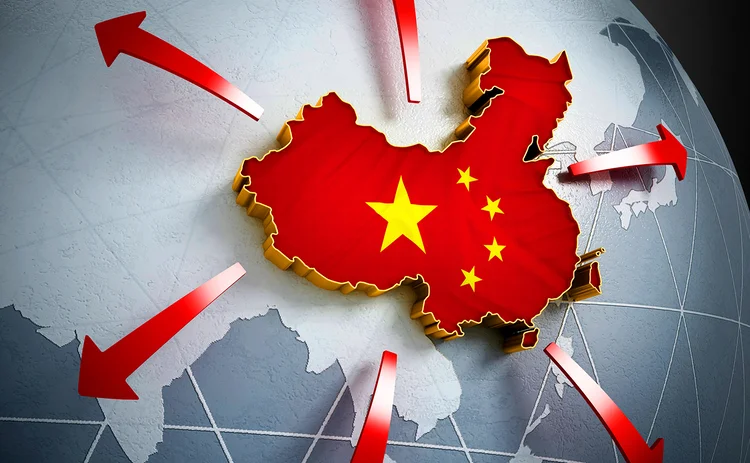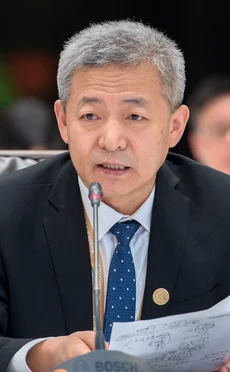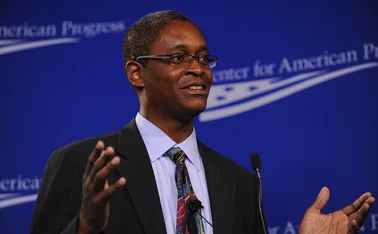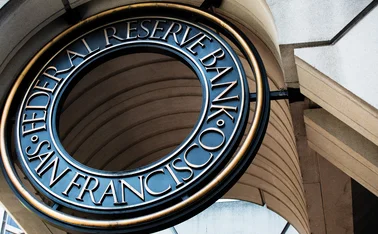
China – Global governance without hegemony
As US power fades, says Pang Zhongying, IFF Academic Committee member, and dean of the Advanced Institute of Marine Development Studies, Ocean University of China, China can create a new non‑hegemonic model of global economic governance based on dialogue by ‘binding its hands and feet’ to allow others to trust its good intentions


Where is global economic governance heading? What will the future of global economic governance hold? These questions are on everyone’s lips.
In the report of the 19th National Congress of the Communist Party of China, President Xi Jinping reaffirmed China’s foreign policy principle of ‘never seeking hegemony’, but this does not mean that China should disavow the role of international leadership. Indeed, it is now engaged in what might be called a non-hegemonic leadership, which is sure to be hugely significant in the future of global economic governance.
China and the established international economic system

China formulated the ‘1+6’ framework, a dialogue between the Chinese Premier and six international economic organisations – including the International Monetary Fund, the Organisation for Economic Co‑operation and Development, and the World Trade Organization – through which roundtables took place in 2016 and 2017.
This dialogue mechanism is crucial for the future of global economic governance. First, China is a key supporter of the international economic order during its current crisis. Currently, the challenge to the existing international economic order comes not from China but from Western countries, and the internal political developments that have seen President Donald Trump elected and the UK decide to leave the European Union. China’s actions do not pose a challenge to the world’s existing liberal order, but are helping to maintain and strengthen it. China’s current major thrust in foreign policy is precisely in support of free trade and globalisation.
Second, China remains willing to accept the important role of the major international economic organisations and their impacts on China. In the period of China’s reform and ‘opening‑up’ that began in 1978, these institutions played an important role in China’s transformation. From China’s perspective, the 1+6 framework indicates that its domestic reform still requires these organisations to continue to introduce existing international rules and norms and assimilate into China’s domestic governance.
China and the newly founded international financial institutions
China is an international leader; but, in China’s case, leadership does not entail hegemony. China leads the Asian Infrastructure Investment Bank (AIIB), but does not take hegemony over other countries inside the bank’s framework.
‘No hegemony in the AIIB’ means two things: first, the world’s leading hegemonic power, the US, has not joined the AIIB; second, China does not seek hegemonic status – such as the US enjoys in the World Bank – even though China is the largest AIIB stakeholder.
China continues to welcome US participation in the AIIB, but few expect that a Trump-led US would have any intention of joining the AIIB, particularly in light of its recent withdrawals from other multilateral institutions. It can be assumed that the US will eventually participate in the AIIB but – unless the AIIB agreement is amended – without the same veto power it enjoys in the World Bank and without surpassing China’s voting power.
Many international co-operation initiatives come to fruition without US involvement. Neither the EU, east Asian monetary and macroeconomic policy co-operation bodies – such as the Chiang Mai Initiative and the Association of Southeast Asian Nations +3 Macroeconomic Research Office – nor the Shanghai Co‑operation Organisation (SCO) include the US.
In the absence of international co-operation from the US, who will take up leadership? As shown by its dealings with the AIIB, China not only functions as a leader in a structure without hegemony, but also – through self-restriction and institutional arrangement – does not employ US-style hegemony that permits it a right to veto significant policymaking.
To avoid further fragmentation of global economic governance, these newly established institutions pay special attention to co-ordination with existing organisations to avoid conflicts. The presence of the AIIB is a challenge to existing institutions, although it has achieved very positive co‑ordination and co-operation with the World Bank and the Asian Development Bank.
It is necessary to mention the New Development Bank (NDB) of the Brics nations – Brazil, Russia, India, China and South Africa. The most important difference between the NDB and the AIIB is that the AIIB has no hegemony but leadership, while the NDB has neither hegemony nor a leader. Thus, the AIIB’s impact is far greater than that of the NDB.
Is future global economic governance without hegemony?
The mission and initial practice of the AIIB answers the predominant question that worries the West: what does ‘new global governance’ or ‘alternative global governance institutions’ mean? The AIIB is an international organisation without hegemony and, to some extent, it represents the concept of global governance without hegemony that China pursues.
China’s leading role in the AIIB is no secret – through the bank, China attempts a role in global economic governance, but not by ignoring the governance constraints imposed on it by the AIIB. In fact, the AIIB is where China volunteers to ‘bind its own hands and feet’ to gain others’ trust, and allows others the opportunity to deal with the ‘China challenge’ that they face.
Some assume that the establishment of the AIIB means placing China’s funds under the dominion of multilateral governance – that is, other member governments preventing China from making financing decisions – instead of allowing Beijing to invest freely worldwide. This is the main reason many European countries chose to participate. Compared with the very different attitudes of Japan and the US, European countries that pursue multilateralism are most aware of the value of multilateral institutions. The AIIB must comply with its own standards in environmental protection, human rights protection and transparency to follow its self-declared ‘best practice’ .
What does the China challenge mean to others? In 2010, the global activities of China’s two largest bilateral development banks, the China Development Bank (CDB) and the Export-Import Bank of China (EIBC), meant that China’s overseas development loans surpassed those of the World Bank – by the end of 2014, the CDB and EIBC had US$684 billion in outstanding loans.
From the perspective of other nations, the BRI will be a target for future global governance, something Chinese policymakers who advocate active participation in global governance only reluctantly face up to
Compared with the CDB and EIBC, the Belt and Road Initiative (BRI) is a more extensive global action, and epitomises more fully the ‘China challenge. From the perspective of other nations, the BRI will be a target for future global governance, something Chinese policymakers who advocate active participation in global governance only reluctantly face up to.
Inspired by the great success of the start-up phase of the AIIB, in 2015 the author was among the first to advocate for the Chinese government to actively apply multilateralism to the BRI. Later, China stressed that the BRI required ‘joint contribution’ to solve the problem of international legitimacy and other international obstacles that the BRI has encountered.
At present, globalisation is in crisis. And China – the world’s largest economy in purchasing power parity – is anxious about deglobalisation and has adopted a policy of supporting globalisation, of which the BRI is the greatest indicator of the continuance of this support.
The main reason China supports globalisation is clear: China is one of its biggest beneficiaries. But continuing to support globalisation in the traditional way will inevitably ignite further conflict with victims of globalisation. The main reason for the ongoing tension between China and the US is that China fully supports globalisation, while the US requires China to surrender huge profits to compensate for the damage globalisation is inflicting on the US: an almost irreconcilable contradiction.
If the world in the future embraces either further multipolarised or unpolarised systems, international organisations that conduct leadership without hegemony, such the AIIB, may play a more influential role in shaping that world.
To aim at a global leadership that is not a hegemony and, in particular, to build global governance without hegemony, is of great significance to the world in the 21st century. The future world needs leadership but, unlike in the 20th century, to resist hegemony as well.
China is not a global governance hegemony succeeding the fading power of the US. So what is the precise role of China in global governance? Looking to the AIIB can supply part of the answer.
Conclusion
Contrary to the concerns of US President Barack Obama’s administration around China’s establishment of the AIIB, the bank – born into a crisis of multilateral systems – played an unexpected role in restraining the crisis of global economic governance, and has now created a new model of global economic governance.
A new question has arisen: is the new global economic governance mode, such as that embodied by the AIIB, sustainable?
The AIIB is still in its infancy, so the answer to that question does not exist in any paper, but “in the future practice of itself”, to paraphrase Jin Liqun, the AIIB’s first president.
The progress of the AIIB has proved that the BRI should seek multilateralisation at multiple levels; this has occurred in such co-operation mechanisms as the ‘1+16’ dialogue framework between China and 16 countries in central and eastern Europe. China is willing to ‘co-construct’ the BRI with the world, and therefore held the first Belt and Road Forum for International Cooperation in May 2017 in Beijing. The question remains: will the BRI, like the AIIB, eventually converge with the new global multilateral system?
Only users who have a paid subscription or are part of a corporate subscription are able to print or copy content.
To access these options, along with all other subscription benefits, please contact info@centralbanking.com or view our subscription options here: http://subscriptions.centralbanking.com/subscribe
You are currently unable to print this content. Please contact info@centralbanking.com to find out more.
You are currently unable to copy this content. Please contact info@centralbanking.com to find out more.
Copyright Infopro Digital Limited. All rights reserved.
As outlined in our terms and conditions, https://www.infopro-digital.com/terms-and-conditions/subscriptions/ (point 2.4), printing is limited to a single copy.
If you would like to purchase additional rights please email info@centralbanking.com
Copyright Infopro Digital Limited. All rights reserved.
You may share this content using our article tools. As outlined in our terms and conditions, https://www.infopro-digital.com/terms-and-conditions/subscriptions/ (clause 2.4), an Authorised User may only make one copy of the materials for their own personal use. You must also comply with the restrictions in clause 2.5.
If you would like to purchase additional rights please email info@centralbanking.com







